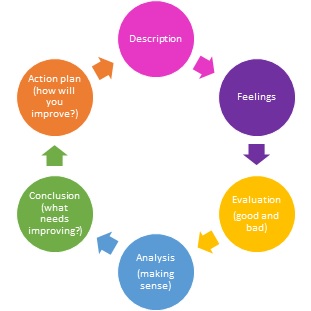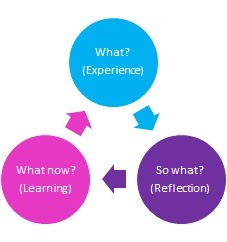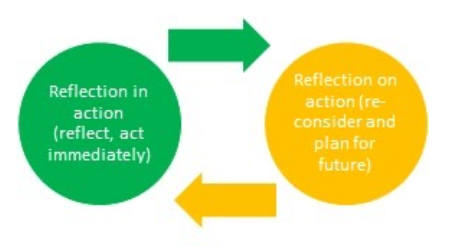The following guidelines is for General Practice (GP) supervisors of Physician Associate students.
Background of reflective practice learning
Currently our Year 1 students take the reflective practice sub-module, as part of their Master's in Physician Associate Studies (MPAS) at City St George's.
This sub-module consists of a lecture and four small group sessions. The lecture introduces our students to the concept of reflective practice, its importance and uses. The students are introduced to three commonly used reflective practice models, Gibbs cycle, Schon and Rolfe models. They then bring their own cases from the GP placements, to discuss in the small group sessions using one of the reflective practice models.
Every student is provided an opportunity to present a case in their group in Term 1 and Term 2. In their final small group session, they are given an opportunity to close the loop of reflective practice for the case they had presented. For example, they can inform us what, if any, changes they implemented in their own practice/in the GP practice as an outcome of their reflection.
Details of the Gibbs cycle, Rolfe cycle and Schon reflective models
| Gibbs cycle | Rolfe cycle | Schon reflective model |
|---|
 |
 |
 |
Guidance for discussing reflective logs
Assessment details
Students write a reflective log within their clinical placement (self) assessment. This does not need to be reviewed by the supervisor.
To pass this element of the module students need to discuss this reflective log with their supervisor. The supervisor needs to document the assessment within the clinical placement assessment form. The supervisor will determine if the "student has demonstrated adequate reflective practice" by answering this question within the clinical placement assessment. If the supervisor does not feel the student has understood reflective practice adequately then they should highlight this in the assessment by stating "disagree" or "strongly disagree" in the sign off.
Year 1
One completed at the end of each term.
Year 2
One completed at the end of each placement.
We suggest the following way to assess the students with their reflective practice case, this guidance will ensure parity between GP practices.
View all Close all
For example: The student may want to reflect on a time when they observed a supervisor dealing with a patient requiring translation. As this was not foreseen when the appointment was booked, the student may comment on how the supervisor managed the time constraints. The supervisor may have asked his/her colleague to help by taking on an extra patient that session. This would demonstrate teamwork for the student.
For example: If the student chooses to use the Gibbs cycle, they would start with a brief description of the case (as above). Then they would discuss emotions of everyone involved. The supervisor feeling stressed, the student picking up on this making them feel anxious and helpless, the patient feeling frustrated due to their inability to communicate, the supervisors’ colleague being understanding and taking on an extra patient etc.
They would move onto evaluating the good and the bad aspects of what happened. It is important for them to acknowledge the positives, as this usually gets lost in reflection. For example, the fact that there is good teamwork and understanding colleagues who are willing to help.
Then they move onto analysis, where they will try to understand why something was good and why something went wrong. For example, the receptionist may not have picked up the patient needed a translator due to time pressures and the patient not requesting a translator. The supervisors’ colleague may have been in a similar situation previously.
Then they move onto conclusion, which is a quick summary of what they will take away from this scenario.
Finally, they will go into action plan, where they will be able to come up with one or two actionable points. For example, they will find out the language line number where they are shadowing/working, so if they were to face a similar situation, they can access it quickly. Or they will be understanding of their colleague if they ever get asked to take on extra work etc.
For example: Both case/scenario specific feedback and individual feedback on the reflective practice. Supervisors are in a better position to inform the students of the resources available at the practice for patients requiring translators.
Making an entry onto the computer system, where it can alert anyone, including the receptionist, that this patient requires a translator. To avoid similar errors in the future. Supervisors will also be able to provide insight to a student who has not gone into enough depth when reflecting.
There are a few examples of reflective practice writing in the resources section in the Academy of Medicine Royal Colleges/COPMed. A reflective practice toolkit, 2018.
Feedback
We are implementing reflective practice to be part of the assessment process, as this will contribute to our students becoming long term reflective practitioners and we consider this a crucial step to their career progression and patient safety.
Therefore, we would very much like to hear back from our supervisors regarding their experiences and how and where we can improve. Please could you send an email to mvijikan@sgul.ac.uk after the assessment with a line or two regarding your opinion on the addition to the assessment.
References